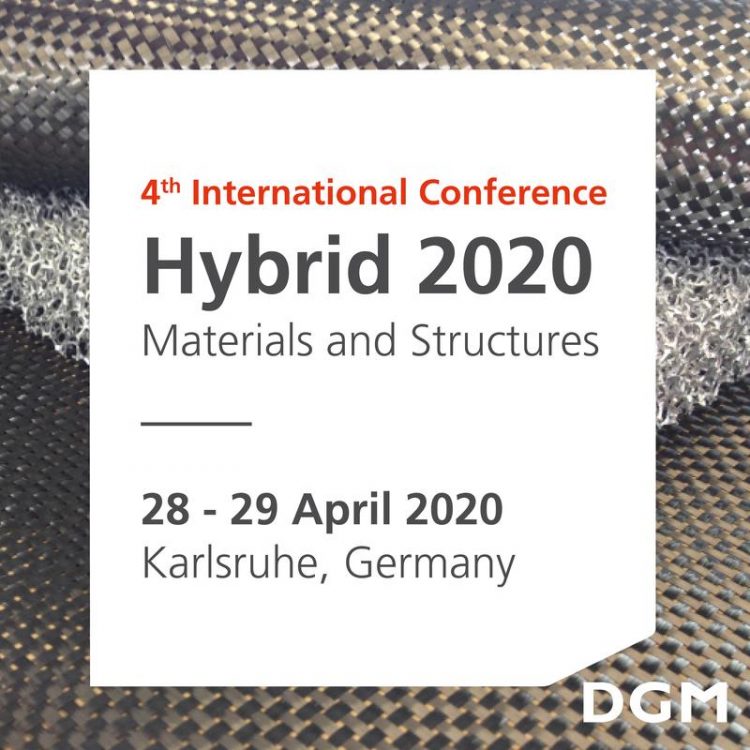4th Hybrid Materials and Structures 2020 28 – 29 April 2020, Karlsruhe, Germany

Hybrid2020 dgm.de
Very often, innovative materials act as trailblazers for the introduction of new technologies and products. Hybrid materials and structures made or joined from several individual components are playing an increasingly important role in the industrial applications of mechanical engineering and construction.
“Hybrid Materials and Structures 2020” covers the entire spectrum of topics, from basic materials to design, from production to application, and thus provides the basis for an in-depth understanding of application-specific material and component behavior. The only limitation is the focus on material combinations that perform structural tasks in some way.
Special Session: “Intrinsic Hybrid Composites”
In multi-material design, hybrid composites joined by downstream processes such as bonding or welding are already established, but often do not fully exploit the lightweight potential. An intrinsic hybrid composite, however, is an integral component in which the various materials are joined in the consolidation or forming process of the metal- or plastic-based component. Hybrid 2020 is dedicating a special session to these material systems.
The conference offers a diverse mix of short talks, poster presentations and poster forums. In addition, the interdisciplinary exchange between science and industry will enable extended networking among the participants.
A DFG priority programme on intrinsic hybrid composites and a German-Canadian graduate school on hybrid fibre composites, the Karlsruhe Institute of Technology (KIT) is home of two major research collaborations dedicated to this class of materials. This also applies to numerous industrial companies, especially from the automotive and supplier industries, and non-university research institutions in the Karlsruhe technology region.
We are looking forward to welcoming you in Karlsruhe!
The following matters will be discussed:
B Basics
• Material compatibility and interface properties
• Residual stresses, ageing and corrosion
C Characterization
• Materialography and microanalytical investigations
• Mechanical testing
• Non-destructive testing and quality assurance
D Design and layout
• Material modelling and simulation
• Construction methods and design principles
• Stress analysis
M Manufacturing
• Manufacturing and processing
• Joining techniques, machining and finishing
O Operation
• Corrosion and corrosion protection
• Maintenance and repair
• Life cycle assessments and recycling
Special Topic “Intrinsic Hybrid Composites”
In particular young scientists are very welcome to actively contribute to the conference by submitting an abstract.
To submit your abstract, please click here: https://hybrid2020.dgm.de/home/?pk_campaign=Portal2
Chair of the conference are
• Prof. Dr.-Ing. Joachim M. Hausmann, Institute for Composite Materials (IVW), Kaiserslautern
• Prof. Dr.-Ing. Marc Siebert, PFH – Private University of Applied Sciences Göttingen
• Dr.-Ing. Axel von Hehl, Leibniz Institute for Materials Engineering – IWT, Bremen
• Prof. Dr.-Ing. Kay André Weidenmann, Institute for Materials Resource Management, University of Augsburg
Abstract submission deadline: 01st November 2019
Further information about the conference
https://hybrid2020.dgm.de/home/?pk_campaign=Portal2
Prof. Dr.-Ing. Joachim M. Hausmann, Institute for Composite Materials (IVW), Kaiserslautern
Prof. Dr.-Ing. Marc Siebert, PFH – Private University of Applied Sciences Göttingen
Dr.-Ing. Axel von Hehl, Leibniz Institute for Materials Engineering – IWT, Bremen
Prof. Dr.-Ing. Kay André Weidenmann, Institute for Materials Resource Management, University of Augsburg
Media Contact
All latest news from the category: Event News
Newest articles

New organoid with all key pancreas cells
Researchers from the Organoid group (previously Clevers group) at the Hubrecht Institute have developed a new organoid that mimics the human fetal pancreas, offering a clearer view of its early development….

Unlocking the potential of nickel
New study reveals how to use single atoms to turn CO2 into valuable chemical resources. Nickel and nitrogen co-doped carbon (Ni-N-C) catalysts have shown exceptional performance in converting CO2 into…

‘Spooky action’ at a very short distance
Scientists map out quantum entanglement in protons. Particles streaming from collisions offer insight into dynamic interactions and collective behavior of quarks and gluons. Scientists at the U.S. Department of Energy’s…



